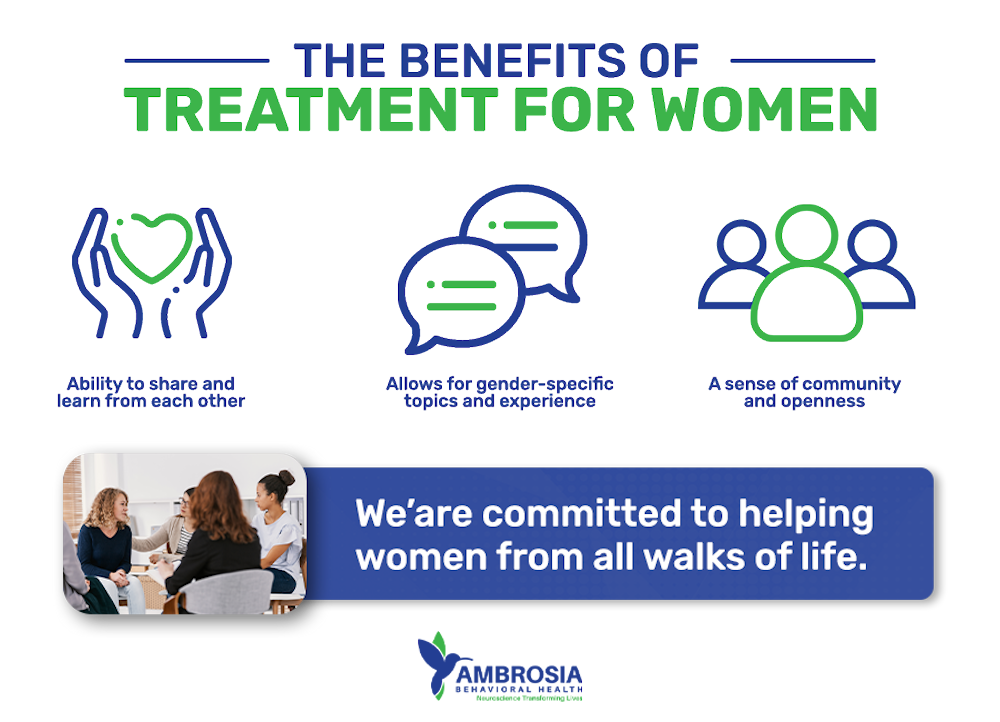Addiction Treatment For Women in South Florida
Drugs manipulate our bodies. They latch to receptors and trigger chemical changes.
Both men and women have the same receptors. But biological markers are different, and that can have a huge impact on both addiction and its recovery. Women’s bodies process and respond to substances differently than their male counterparts. And women face challenges due to their gender that men don’t always encounter.
For women with addictions, treatment is the answer. However, the programs they need must be tailored, so they get effective care. And sometimes, women fare best in facilities that only accept residents like them. Luckily, addiction treatment for women is available at Ambrosia Behavioral Health’s rehab facility in South Florida.
At Ambrosia Behavioral Health in South Florida, our utmost dedication lies in assisting our female clientele in their journey toward healing within a secure and nurturing setting. We specialize in addiction treatment tailored specifically for women, enabling them to concentrate on tackling the underlying causes of their substance abuse.
Recognizing the individuality of each woman’s struggle with addiction, our women’s addiction treatment center in South Florida offers customized care levels to effectively aid them in breaking free from the destructive cycle, achieving recovery, and sustaining long-lasting sobriety.
The National Institute on Drug Abuse (NIDA) says women cite these reasons for substance abuse:
- Weight control: Some drugs suppress the appetite, and others tinker with metabolism. A regular habit could keep a woman from both eating and packing on pounds.
- Overwork: Fulltime jobs, childcare duties, and other family obligations can make a woman run from dawn to dusk. Some drugs seem to boost energy, so a woman can get everything done.
- Pain control: Researchers say women feel pain more acutely than men, and women tend to struggle with chronic pain more frequently. Some drugs boost feel-good brain chemicals, so discomfort is easier to ignore.
- Self-treatment: Women struggling with co-existing mental health challenges like depression or anxiety can lean on addictive drugs as they attempt to ease the pain.
Men can struggle with these same triggers, as they’re (obviously) not unique to women. But they do seem to be a bit more common among females than males.
Similarly, both men and women can be victims of sexual abuse. But the way they process trauma can vary, and research suggests that women turn to drugs to ease the memories.
According to the National Council on Alcoholism and Drug Dependence, 70 percent of female drug users were sexually assaulted before their 16th birthday. These women weren’t sure how to process their memories and move forward, so they turned to drug obliteration instead. They may have felt as though they had no other choice.
What Drugs Do Women Commonly Abuse?
Women tend to use:
- Stimulants. Women are more vulnerable to the rewarding impact of these drugs, research shows. Brain changes are bigger, and the drugs just feel good in the body. That can prompt women to develop addictions quicker than men.
- Opioids. Women are more likely to abuse pain pills without a prescription, The NIDA says. These drugs are remarkably effective at changing body chemistry and prompting addiction.
- Depressants. Women who feel nervous and/or can’t sleep often head to the doctor. When they do, they can walk out with powerful medications that alter brain chemistry. Addictions can quickly form.

Do Women Need Gender-Specific Treatment?
Women are a minority in addiction treatment programs. According to the Substance Abuse and Mental Health Services Administration, about 33% of program admissions are women. That means the average woman enrolling in care is surrounded by men.
Treatment programs are often communal. People spend time in group settings to learn more about addiction and develop better habits. Women must feel comfortable discussing their past openly, and some women might balk at talking about rape, childbirth, or hormones with men in the room. If they’re not honest, they won’t get the full benefits of treatment.
Perhaps the solution is personalized care, no matter what gender is involved. Medical providers should strive to meet women where they are and hope to educate and inspire women struggling to improve. They should address all of the things that support a woman’s addiction, and they should offer solutions a woman can put to use.
Treatment programs should also address a woman’s real barriers to recovery. For example, research suggests a woman’s hormones could spark drug cravings, which increases her relapse risk. Her treatment program should help her deal with this problem so she can move past it when it happens.
Personalized care can be provided in a gender-specific program. And many programs made just for women offer a deeper level of customization than standard versions do. A woman who gets the care she needs, regardless of setting, is a woman who can get better.
At our South Florida rehab center, we provide addiction treatment for women and understand the challenges women face versus men. Therefore, our team can cater to those needs effectively.

Dr. Alam is an internationally renowned psychiatrist with academic affiliations with Northwestern University and University of Illinois, Chicago where he completed his residency training. He has been a principal investigator for over forty studies and has been involved in research leading to the approval of most psychiatric medications currently on the market. He is the founder of the Neuroscience Research Institute which continues to conduct research on cutting edge medication and interventional psychiatry. Dr. Alam is a Distinguished Fellow of the American Psychiatric Association and the American Society of Addiction Medicine. He has won several awards and has been featured extensively on radio and television.








